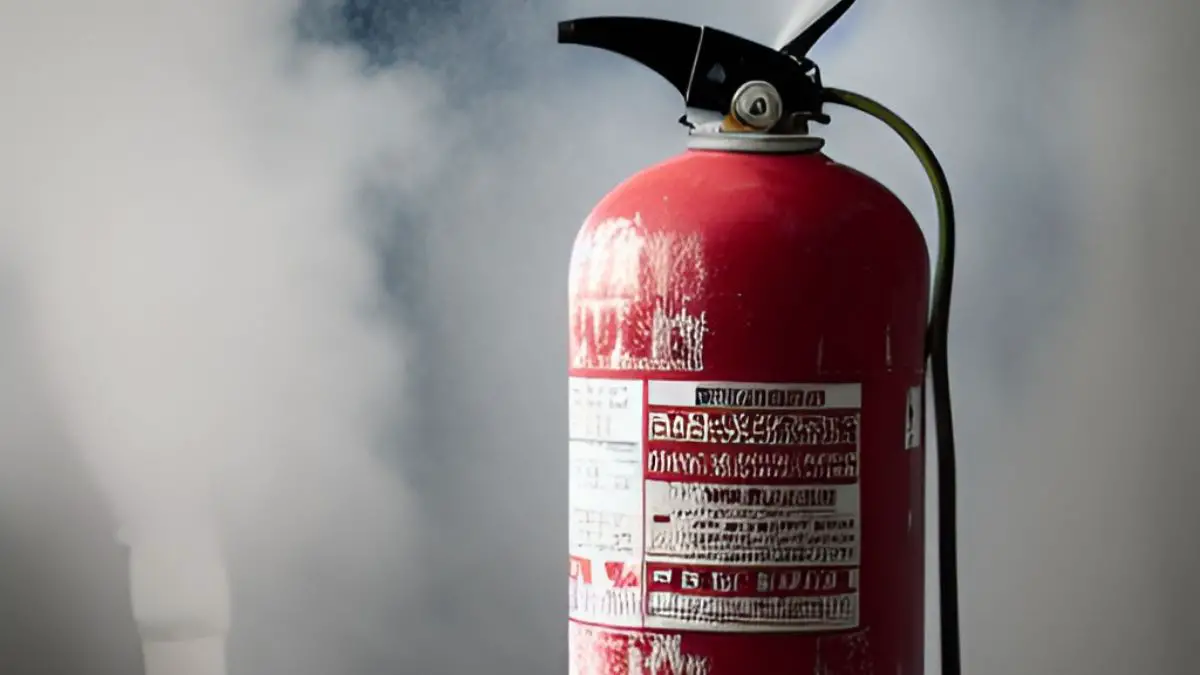Can you believe it? Fire extinguishers can actually freeze. It may sound crazy, but it’s true! In this blog post, we’ll explain all about what happens when a fire extinguisher freezes.
Will the fire extinguisher still work? Or will it freeze and not be effective? Will it explode?
Keep reading to find out!
How Does a Fire Extinguisher Work?
A fire extinguisher works by interrupting the chemical reaction that fuels a fire. The most common type of extinguisher, known as a dry chemical extinguisher, contains a chemical agent that smothers the flames.
This agent is stored under pressure, and when the extinguisher is activated, the agent is expelled through a nozzle in a fine mist. The mist quickly coats the fuel, interrupting the chemical reaction and smothering the flames.
Another type of extinguisher, known as a water-based extinguisher, uses water to cool the fuel and deprive the fire of oxygen. ‘
However, water-based extinguishers are less effective on fires involving combustible liquids, as the water can actually spread the flames in the event of a grease fire or electrical fire.
For this reason, choosing the right type of extinguisher for each situation is important.
What is the Freezing Point of a Fire Extinguisher?
Knowing the freezing point of your fire extinguisher is important, as you want the contents to be clean and usable.
The freezing point of a fire extinguisher is the temperature at which the contents of the extinguisher will change from a liquid to a solid. This process is known as phase change, which occurs when the molecules in a substance reach a certain energy level.
The freezing point of a fire extinguisher is much lower than that of water, and it can vary depending on the type of extinguisher.
Dry chemical extinguishers have a freezing point of -40 degrees Fahrenheit, while carbon dioxide extinguishers have a freezing point of -109 degrees Fahrenheit.
If you live in an area with very cold winters, you may need to store your extinguisher in a heated area to prevent it from freezing.
Can a Fire Extinguisher Freeze and Still be Effective?
The answer to this question depends on the type of fire extinguisher you have. If your fire extinguisher contains water or foam, it will likely freeze and cease to work properly
However, fire extinguishers containing dry chemicals, CO2, or Sodium Bicarbonate are designed to operate in extreme conditions and are generally not affected by freezing temperatures.
Storing your fire extinguishers in an adequately warm and dry atmosphere is still a good idea to prevent ice damage to the external components like the pin or the handle.
How Can You Prevent Your Fire Extinguisher from Freezing?
To prevent your fire extinguisher from freezing, keep it in a temperature-controlled environment and check the pressure gauge regularly.
You should also regularly inspect the hose and nozzle for signs of wear and tear. If you notice any damage, replace the affected parts immediately.
What Should You Do if Your Fire Extinguisher Freezes?
If your fire extinguisher does freeze, you can take a few steps to thaw it out.
- Remove the pin and hold the nozzle over a garbage can.
- Turn the extinguisher upside down and strike the bottom with a rubber mallet. This will help to loosen any ice that has formed inside the extinguisher.
- Turn on a faucet and hold the nozzle under running water until the ice has melted. Once the fire extinguisher is thawed out, check the pressure gauge to ensure it is still full.
Frequently Asked Questions (FAQs)
Can I keep a fire extinguisher in my car in the winter?
You bet—in fact, it’s a good idea! A fire extinguisher can be a lifesaver in the event of a winter car fire. Be sure to check the expiration date on your extinguisher and read the instructions carefully to be prepared to use it in an emergency.
Do fire extinguishers expire?
First Alert recommends that fire extinguishers be replaced every 10-12 years, regardless of whether or not they have been used. So if you can’t remember when you bought your fire extinguisher, it’s probably time to dispose of it and purchase a new one.
Are fire extinguishers toxic?
Fire extinguishers are safe to use. However, it’s important to understand that all fire extinguishers contain chemicals that can be harmful if inhaled or ingested. For this reason, it’s important to read the label carefully and follow the manufacturer’s instructions.
Can fire extinguishers cause frostbite?
In some rare cases, yes – but only if the fire extinguisher is used incorrectly. If you apply the extinguisher directly to your skin for a prolonged period, you may experience frostbite. However, if you direct the stream of the extinguisher toward the base of the fire, you should be safe from frostbite.


